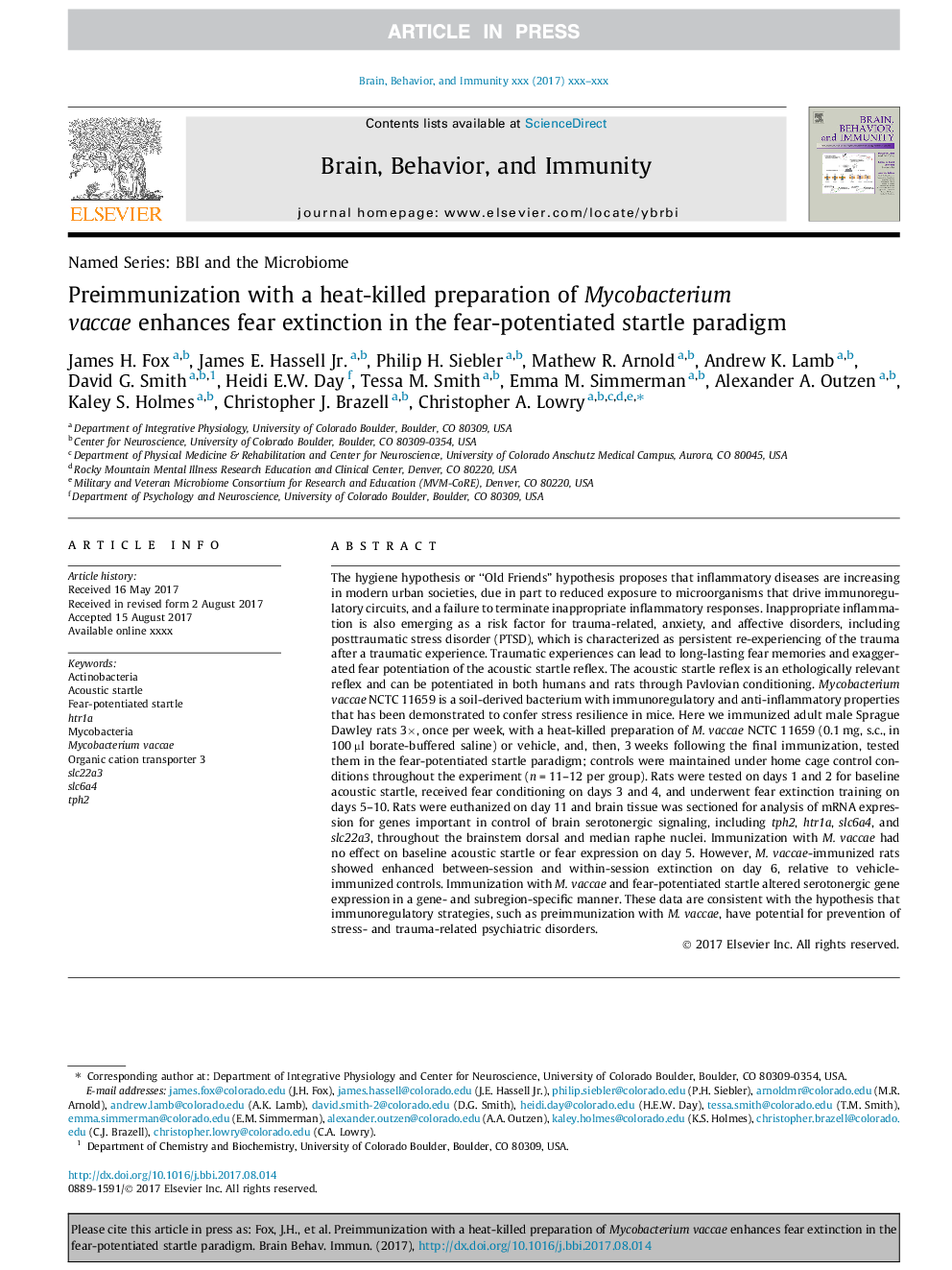| کد مقاله | کد نشریه | سال انتشار | مقاله انگلیسی | نسخه تمام متن |
|---|---|---|---|---|
| 7279760 | 1473900 | 2017 | 15 صفحه PDF | دانلود رایگان |
عنوان انگلیسی مقاله ISI
Preimmunization with a heat-killed preparation of Mycobacterium vaccae enhances fear extinction in the fear-potentiated startle paradigm
دانلود مقاله + سفارش ترجمه
دانلود مقاله ISI انگلیسی
رایگان برای ایرانیان
کلمات کلیدی
موضوعات مرتبط
علوم زیستی و بیوفناوری
ایمنی شناسی و میکروب شناسی
ایمونولوژی
پیش نمایش صفحه اول مقاله

چکیده انگلیسی
The hygiene hypothesis or “Old Friends” hypothesis proposes that inflammatory diseases are increasing in modern urban societies, due in part to reduced exposure to microorganisms that drive immunoregulatory circuits, and a failure to terminate inappropriate inflammatory responses. Inappropriate inflammation is also emerging as a risk factor for trauma-related, anxiety, and affective disorders, including posttraumatic stress disorder (PTSD), which is characterized as persistent re-experiencing of the trauma after a traumatic experience. Traumatic experiences can lead to long-lasting fear memories and exaggerated fear potentiation of the acoustic startle reflex. The acoustic startle reflex is an ethologically relevant reflex and can be potentiated in both humans and rats through Pavlovian conditioning. Mycobacterium vaccae NCTC 11659 is a soil-derived bacterium with immunoregulatory and anti-inflammatory properties that has been demonstrated to confer stress resilience in mice. Here we immunized adult male Sprague Dawley rats 3Ã, once per week, with a heat-killed preparation of M. vaccae NCTC 11659 (0.1 mg, s.c., in 100 µl borate-buffered saline) or vehicle, and, then, 3 weeks following the final immunization, tested them in the fear-potentiated startle paradigm; controls were maintained under home cage control conditions throughout the experiment (n = 11-12 per group). Rats were tested on days 1 and 2 for baseline acoustic startle, received fear conditioning on days 3 and 4, and underwent fear extinction training on days 5-10. Rats were euthanized on day 11 and brain tissue was sectioned for analysis of mRNA expression for genes important in control of brain serotonergic signaling, including tph2, htr1a, slc6a4, and slc22a3, throughout the brainstem dorsal and median raphe nuclei. Immunization with M. vaccae had no effect on baseline acoustic startle or fear expression on day 5. However, M. vaccae-immunized rats showed enhanced between-session and within-session extinction on day 6, relative to vehicle-immunized controls. Immunization with M. vaccae and fear-potentiated startle altered serotonergic gene expression in a gene- and subregion-specific manner. These data are consistent with the hypothesis that immunoregulatory strategies, such as preimmunization with M. vaccae, have potential for prevention of stress- and trauma-related psychiatric disorders.
ناشر
Database: Elsevier - ScienceDirect (ساینس دایرکت)
Journal: Brain, Behavior, and Immunity - Volume 66, November 2017, Pages 70-84
Journal: Brain, Behavior, and Immunity - Volume 66, November 2017, Pages 70-84
نویسندگان
James H. Fox, James E. Jr., Philip H. Siebler, Mathew R. Arnold, Andrew K. Lamb, David G. Smith, Heidi E.W. Day, Tessa M. Smith, Emma M. Simmerman, Alexander A. Outzen, Kaley S. Holmes, Christopher J. Brazell, Christopher A. Lowry,